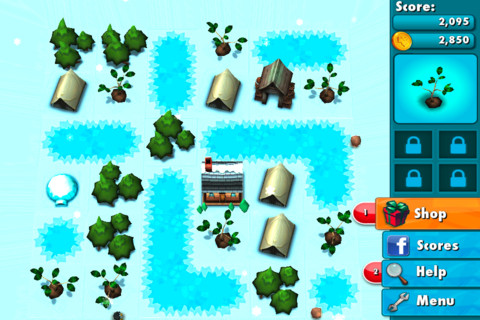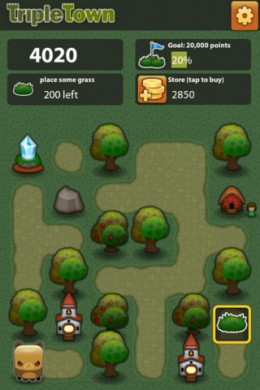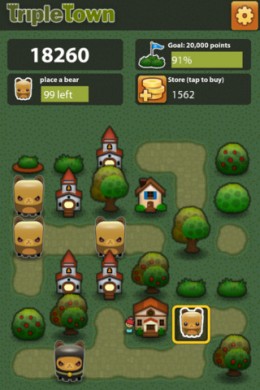 Unfortunately, cases of blatant cloning aren’t anything new on the App Store, with many cases being reported, the most recent being the Tetris v. Mino case. For an indie developer, dealing with such a situation sucks, with the only recourse typically being a lengthy legal battle that hardly guarantees an easy victory.
Unfortunately, cases of blatant cloning aren’t anything new on the App Store, with many cases being reported, the most recent being the Tetris v. Mino case. For an indie developer, dealing with such a situation sucks, with the only recourse typically being a lengthy legal battle that hardly guarantees an easy victory.
However, that legal option may be looking better for developers looking for a way to combat copying. Recent developments in the Spry Foxx LLC v. LOLApps, Inc case, in which the developers of Triple Town filed suit against the developers of Yeti Town for copyright infringement, have revealed new interpretations of copyright law by a court which seem to favor and give weight to the efforts put forth by creative developers.
As before, keep in mind that we’re not lawyers; we just write about video games on the Internet. Sunstein Law, however, runs an intellectual property newsletter written by law types, and they currently have a comprehensive article on their site regarding the latest developments with the Triple Town court. As we’ve done in the past, we’ll block-quote portions of its article to make sure we don’t get anything wrong and offer our view.

First, a brief history on the current field of copyright law and gaming:
Earlier this year, in Tetris Holding, LLC v. XIO Interactive, LLC, an unabashed Tetris clone suffered a big defeat. Rejecting what has become a clone developer’s standard defense – that it copied only non-expressive, functional elements of the original game – the court found that the clone had infringed the Tetris copyright.
Within days of the Tetris decision, Spry Fox was citing it in support of its own copyright complaint. At the same time, 6Waves asked the court to throw out Spry Fox’s lawsuit based on the same kind of unavailing arguments used by the defendant in Tetris.
Now, in another victory for video game innovators, the court in Seattle has rejected that argument.
As we noted earlier, the ruling in the Tetris case was a bit of a big deal for copyright holders, but there was some thought that it might be an isolated case because of the fact that it was a case of (arguably) blatant copying, and because it was Tetris. It appears however, that might not be the case.
A bedrock principle of copyright law – albeit easier to state than to apply – is that copyright protects the expression of a particular work but not its underlying idea. As in the Tetris case before it, the Spry Fox litigants focused on separating the protectable expression of Triple Town from its underlying idea.
For its part, 6Waves argued that Spry Fox’s claims were doomed to failure because Spry Fox had alleged copying only of the rules, game play and concept of Triple Town, all of which 6Waves asserted are not entitled to copyright protection: “The fundamental problem Spry Fox faces is that the two games look nothing alike, so it cannot claim copying of any expressive aspect of Triple Town.”
The defense of games looking nothing alike seemed to be the go-to defense for most clones. In essence, if you gave a clone a proper re-skin, you could potentially copy all the underlying rules, themes and concepts and get away with little potential recourse.


However, the Triple Town court appears to have decided not to side completely with that view. In discussing what it considers ‘elements of express’ (i.e. things that can be copyrighted), the court writes:
A video game, much like a screenplay expressed in a film, also has elements of plot, theme, dialogue, mood, setting, pace and character. Spry Fox took the idea underlying Triple Town and expressed it with its own characters, its own setting, and more. These objective elements of expression are within the scope of Spry Fox’s copyright.
This is an important distinction that arguably hasn’t really been made before. The court seems to be saying that developers should be afforded more protection than simply against clones that don’t even bother to significantly change sprites/arts (i.e. like the Tetris case). Instead, they may be given protection against elements that are more abstract, such as plot, theme and more. The concept of a protection for thematic elements would prove important for Spry Fox, as Sunstein further writes:
Comparing the descriptions and screen shots of the two games, the court found Spry Fox’s allegations “more than adequate” to highlight the objectively similar expression embodied in Yeti Town. In doing so, the court noted that the games share a similar object hierarchy (“Progressing from grass to bush to tree to hut is similar to progressing from sapling to tree to tent to cabin.”). More importantly, the court pointed to the similarities in the overall setting and theme of the games (“A snow field is not so different from a meadow, bears and yetis are both wild creatures . . .”).
Having found plausible substantial similarity between the expressive elements in Triple Town and the corresponding elements in Yeti Town, and citing numerous comments from game reviewers and bloggers on the games’ striking similarity, the court denied 6Waves’s motion to dismiss Spry Fox’s copyright claims.
As the Sunstein post mentions, this is really just the beginning of what will most likely be a lengthy battle. The court only ruled that Spry Fox’s case has enough merit to continue to the next phase of litigation. Still, the interpretation of elements such as plot and theme as being protected in games is a very interesting development, and, if adopted by other courts, has a chance of giving developers much more protection in their creative design elements than previously thought. Sunstein concludes with one possible reason for this shift in legal interpretation:
Spry Fox also teaches that advances in technology may require us to rethink the idea/expression dichotomy as applied to video games. Many of the cases that 6Waves relied on date back to the 1980s and involved video games running on 8-bit home computers with 64k of RAM. Given the hardware constraints of the day and the limitations they imposed on video game developers trying to express their ideas, it is hardly surprising that the courts found most of the game elements at issue to fall on the (unprotectable) idea side of the idea/expression dichotomy.
Regardless, it looks like the battle against rampant cloning is heating up from a legal standpoint, with the possibility of legitimate legal recourse looking more likely for developers. Either way, we’re going to be very interested in the future proceedings in the Triple Town case, especially as we look towards the juggernaut EA v. Zynga case as that heads to court. Finally, feel free to visit Sunstein’s write-up on the entire decision, as there’s a lot more discussion on what the court decided.